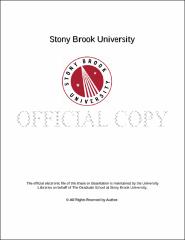| dc.identifier.uri | http://hdl.handle.net/11401/76590 | |
| dc.description.sponsorship | This work is sponsored by the Stony Brook University Graduate School in compliance with the requirements for completion of degree. | en_US |
| dc.format | Monograph | |
| dc.format.medium | Electronic Resource | en_US |
| dc.language.iso | en_US | |
| dc.publisher | The Graduate School, Stony Brook University: Stony Brook, NY. | |
| dc.type | Thesis | |
| dcterms.abstract | Periodontal disease is one of the most common chronic inflammatory diseases, and causes severe debilitation due to the loss of teeth. There are two main strategies utilized in the treatment of periodontal disease: (1) local mechanical therapy, such as scaling and root planing and/or periodontal surgery, as well as local adjunctive antimicrobial (Atridox, Arestin, and Periochip) therapy, and (2) addition of an adjunctive therapy such as host-modulation therapy (HMT). Regarding the latter, there is currently only one systemically administered FDA-approved medication for the treatment of chronic periodontitis, Periostat®, a non-antimicrobial doxycycline-based MMP-inhibitor, which was developed decades ago. The current study assessed a novel NON-tetracycline or NON-doxycycline-based host-modulation medication, which is a triketonic (rather than diketonic like doxycycline), chemically-modified curcumin 2.24 (CMC2.24), and was tested for efficacy in reducing periodontal bone loss in a rat model of experimental periodontitis. Periodontitis was induced in 50 adult male rats by repeated local injection of phosphate buffered saline (PBS; control) or lipopolysaccharide/endotoxin (LPS; experimental) into the gingiva. Experimental groups were orally administered either curcumin or CMC2.24 (30mg/kg), whereas the untreated LPS rats and PBS rats received vehicle alone. Both the “prophylactic†and “therapeutic†models were employed. The 20 rats in Experiment 1 (the “prophylactic†protocol) were injected with either PBS or LPS, and at the same time, systemically administered daily with the vehicle, or curcumin or CMC2.24 for 2-weeks via oral gavage. The 30 rats in Experiment 2 (the “therapeutic†protocol) were sub-divided into Experiment 2A (1-week duration of CMC2.24) or 2B (2-weeks duration of CMC2.24) to assess the “therapeutic†effects of different durations of treatment AFTER periodontal disease had already been established. After sacrifice, gingival tissue, blood, and alveolar bone were collected and analyzed. The jaws were dissected, defleshed, photographed, and bone loss was measured morphometrically and radiographically. The gingival extracts and blood samples were analyzed for matrix metalloproteinases (MMP-2 and MMP-9) by gelatin zymography, and cytokines by ELISA. In general, the LPS group with no treatment exhibited increased MMP-2 and MMP-9, cytokines (IL-1β, TNF-α) and alveolar bone loss. CMC2.24 was found to be more effective than curcumin in reducing MMPs, cytokines and alveolar bone loss. CMC2.24 treatment significantly reduced the periodontal bone loss in the rats in both the “prophylactic†and “therapeutic†models of drug administration; regarding the latter model, 2-weeks of treatment was required since the shorter duration (1-week) did not show significant effects except for a reduction in MMP-9. This study found that systemic administration of CMC2.24, a novel triketonic zinc-binding chemically-modified curcumin, reduced both local and systemic inflammation by modulating the production of cytokines and MMPs and attenuated periodontal bone loss in experimental periodontitis in both the “prophylactic†and “therapeutic†models. | |
| dcterms.available | 2017-09-20T16:50:43Z | |
| dcterms.contributor | Carrion, Julio A | en_US |
| dcterms.contributor | Gu, Ying | en_US |
| dcterms.contributor | Golub, Lorne M | en_US |
| dcterms.contributor | Simon, Sanford R | en_US |
| dcterms.contributor | Johnson, Francis | en_US |
| dcterms.contributor | . | en_US |
| dcterms.creator | Wang, Howard Hao | |
| dcterms.dateAccepted | 2017-09-20T16:50:43Z | |
| dcterms.dateSubmitted | 2017-09-20T16:50:43Z | |
| dcterms.description | Department of Oral Biology and Pathology | en_US |
| dcterms.extent | 63 pg. | en_US |
| dcterms.format | Monograph | |
| dcterms.format | Application/PDF | en_US |
| dcterms.identifier | http://hdl.handle.net/11401/76590 | |
| dcterms.issued | 2016-12-01 | |
| dcterms.language | en_US | |
| dcterms.provenance | Made available in DSpace on 2017-09-20T16:50:43Z (GMT). No. of bitstreams: 1
Wang_grad.sunysb_0771M_12945.pdf: 29919470 bytes, checksum: 9f6c875ff2b38f47562d0dc9815dc226 (MD5)
Previous issue date: 1 | en |
| dcterms.publisher | The Graduate School, Stony Brook University: Stony Brook, NY. | |
| dcterms.subject | Anti-inflammatory, Chemically Modified Curcumin (CMC2.24), Host modulation, Matrix metalloproteinase, Periodontal Disease, Rat Periodontitis Model | |
| dcterms.subject | Dentistry -- Medicine -- Pharmaceutical sciences | |
| dcterms.title | Effects of Chemically-Modified-Curcumin (CMC2.24) on Rat Experimental Periodontitis | |
| dcterms.type | Thesis | |

